Henny Youngman
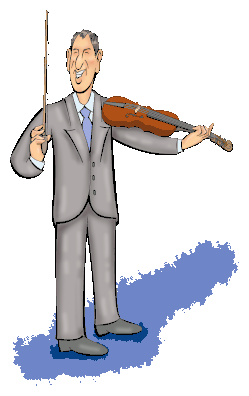
Click on the image to zoom in and out.
|
"I never forget a face, but in your case I'll make an exception." |
|
- |
Henny Youngman or Groucho Marx1 |
Footnote
Although this quote was in one of Henny's joke books, it is almost universally attributed to Groucho. On the other hand, the scholars who accept the Groucho attribution nevertheless find the actual source of the quote elusive.
You would think that there would be a definitive biography of one of the originators of modern stand up comedy. But alas, that doesn't seem to be the case. Fortunately, by sifting through what we do have, we can get an idea of the life and times of Henry "Henny" Youngman.
Henny Youngman was born to Olga and Jacob Yungman (as the Yiddish name, יונגמאן, was first transcribed) in London, England. This was either in 1905 (according to Henny) or 1906 (according to most other sources). But within a few years the family had relocated to Brooklyn. There, like many kids in his socio-economic class, Henny attended the local public school. But as was true of his contemporary New Yorker, Jackie Gleason, his comedic personality worked against the grain of his teachers, and he (and Jackie) never graduated.
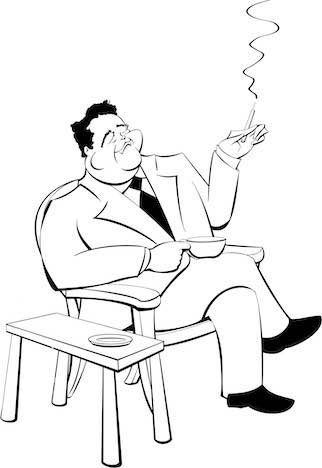
Jackie Gleason
Henny's Contemporary.
Like most performers then and now, Henny got his start in local theaters. Once his dad learned his son was doing a comedy routine at Brooklyn's 16th Street Theater - and on Yom Kippur no less. Jacob was outraged that his kid would work on the holiest of the holidays and with the assistance of a policeman hauled Henny off the stage.
Jacob and Olga soon realized Henny was set on being an entertainer and had him take violin lessons. At that time good music was necessarily live music, and good musicians could actually make their craft a profession, at least part time.2 While still in his teens Henny led a band called the Swanee Syncopaters or whatever else they felt like calling themselves.3
Footnote
Sometimes even well-known musicians had a day job well into their careers. When Johnny Horton was a star on Louisiana Hayride, there were times he had regular job and only appeared on weekends. And for years John Sheahan worked for Ireland's Electrical Supply Board as an electrician and draughtsman while providing his master fiddling for the famed Irish Folk group The Dubliners. Sidemen who sometimes belonged to more than one group would often juggle their music careers with other professions. One of the most capable country and western steel-guitarist would swap off playing in his usual group and the others while fitting his performances within his non-musical schedule.
Footnote
You can look through old newspapers and find references to the Swanee Syncopaters mostly around 1926. However, Henny is not mentioned. By 1929 there was a group with a slightly different spelling, the Swanee Syncopators being recorded under the baton of Meyer Davis.
By necessity Henny worked at a plethora of occupations in these early years. For a time he was employed at Kresge's Department Store where he met Sadie Cohen. They married in 1928.
One of Henny's steadier jobs was working in a shop where he would print up business cards While-U-Wait. This part of Henny's career was independently confirmed by sleight of hand magician, John Scarne, later to gain fame as a gambling consultant and author. When John was seventeen he had decided to turn professional and needed to find an agent. Since he needed some business cards he walked into Henny's shop, and when Henny learned John was a magician he asked him to do a trick. Henny's inevitable comment was "That's pretty good. I bet you can turn a car into an alley."4
Footnote
Henny printed up John's cards for $1.50. Today 100 cards might run $30. That's about 30% above the estimated rise in the Consumer Price Index.
But Henny was determined to be an entertainer not a printer. Under his direction the Swanee Syncopaters played for dances, weddings, and bar mitzvahs. Then between songs Henny would tell his jokes. Even after he turned to pure comedy he kept his violin in hand and he would play scratchy screeching passages between the bon mots.
Despite his deliberately bad violin playing, the Swanee Syncopaters must have been pretty good since they worked their way up from local New York City venues to the Catskills resorts or what was commonly known as the Borscht Belt. Their first job was at the Swan Lake Inn where Henny was also the social director.
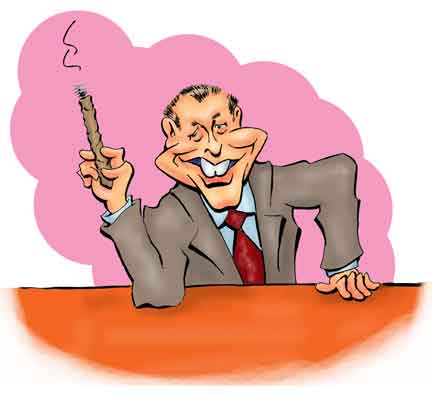
Milton Berle
The threw the work to Henny.
Of course, they kept playing elsewhere, and it was when they were booked at the Nut Club in Mountainside, New Jersey, that Henny went to stand-up. The comedy act that was originally scheduled didn't show, and the manager asked Henny to take their place. The audience loved him and "Hen"5 Youngman's Swanee Syncopaters (or whatever) faded from history.
Footnote
"Hen" was the monicker of his first selection. But he decided that since "Hens" could lay an egg, so he went for Henny instead.
By then Henny had already made some important contacts. Milton Berle was a fast rising comedian and first met Henny at his printing shop. In addition to printing up business cards, Henny would run off cards with jokes and gags for easy reference. Milton would drop into the shop from time to time and borrow some of the gags. In gratitude when Milton had a job offer that he wouldn't fit to his schedule, he'd throw the work toward Henny. Henny would later acknowledge Milton's help in a typical Youngmanian fashion. If a joke went flat, he'd say "That's the last time I steal a joke from Milton Berle."
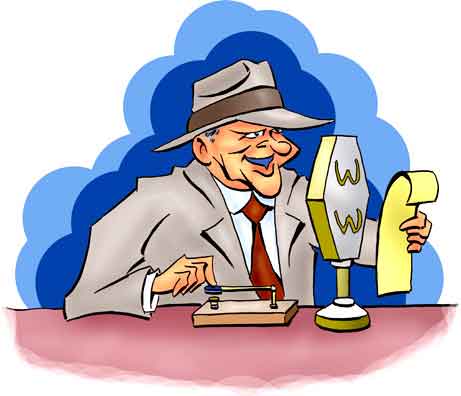
Walter Winchell
Entertainment Journalist
(Psst! Gossip Columnist)
Henny's act quickly developed into his lightning fast zingers, and it wasn't long before he came to the attention of Walter Winchell, who was the nation's #1 entertainment journalist - that is, gossip columnist. After catching Henny's act, he wrote up a review and dubbed Henny the "King of the One-Liners".
Still, Henny's rise was by no means meteoric. It wasn't until he was over thirty that his big break came. In 1937, he was invited to appear on the Kate Smith Show. Although mostly remembered only by aficionados of Old Time Radio, Kate was one of the biggest singing stars in America and best known for her stirring renditions of "God Bless America". Henny was such a hit that he was immediately hired as a regular. His first appearance also convinced Henny's mom that he was in the right profession - at least after he showed her his $250 paycheck.6
Footnote
Correcting for inflation, this would be about $10,000 in today's household purchasing power.
Meteoric rise or no, by the 1950's Henny was one of the top comics in America. With his rapid fire non-stop delivery, Henny's acts were short - 5 to 6 minutes was common; 10 minutes was lengthy - and so he was perfect for the now extinct electronic version of vaudeville - the television variety show.
It's easy to forget how popular variety shows were when a household had only a single television set and everyone had to watch the shows in tandem. In your typical variety show, the idea was to have something for everyone and variety shows were a way to preserve family harmony. Henny's acts were perfect. If Ed Sullivan found he needed a few minutes to fill out his "really big shew", he could always call on Henny.
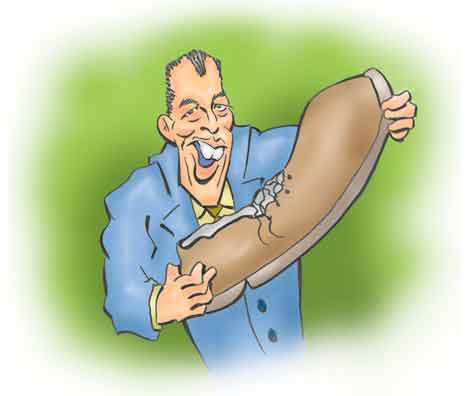
Ed Sullivan
He could call on Henny.
But most of Henny's performances were live and in whatever genre would pay. His philosophy was to accept the work, take the money - "Nem di gelt!" - and go on to the next job. He always had his phone number listed in the New York City directory so anyone who wanted to hire him could give him a call. His pay scale was also quite flexible. Once he had been playing before a packed auditorium, the type of performance for which he typically received several thousand dollars. Then when his act was over and he was leaving, he passed by a side room where a bar mitzvah was in progress. He introduced himself to the father and did a 10 minute act for $100.7
Footnote
We see that Henny's philosophy was similar to that of writer, Charles Williams, who was one of the friends of C. S. "Jack" Lewis and a member of the famous group called The Inklings. Charles was asked to write a 4000 word religious pamphlet for which he was offered £2.2.0 which was a bit more than $8. "4000 words for £2.2.0 - I ask you!", he wrote to his wife Michal. "Nevertheless I think I shall do it, and make £2.2.0 instead of nothing."
Today's Henny's choice of topics may raise an eyebrow and perhaps even draw some criticism as Henny's stock included what we would now call ethnic humor. He himself told a number of jokes where the protagonists were Jewish and Polish. Such jokes were quite mainstream in the 20th century and rarely drew complaints.
Also in the tenor of the time, "wife jokes" were common and in fact made up a large part of Henny's repertoire. Jokes like "I miss my wife's cooking - as often as I can" and "I take my wife everywhere - but she always finds her way home" peppered his acts. Sadie, Henny said, knew he was joking, and they stayed married until her death in 1987.
Henny's most famous one-liner "Take my wife - please!" was originally the punch line of a slightly longer joke - two lines - which Henny himself soon dropped. "Women are crazy!" Henny had said. "Take my wife [pause] please!" But the now iconic line originated without any intent at humor. Sadie had accompanied Henny to one of his shows and the usher was going to show her to her seat. Henny simply asked him to "Take my wife, please." And that was that.
Drawing somewhat less censure today were Henny's doctor and psychiatrist jokes:
A doctor gave a man six months to live. The man couldn't pay his bill. So the doctor gave him another six months.
A man when to see a psychiatrist.
"Doctor! I keep thinking I'm a fox terrier!"
"Well," the doctor said, "just lie down on the couch."
"I can't," the patient said. "I'm not allowed on the furniture."
Of course, as King of the One-Liners, a lot of Henny's jokes were indeed one-liners:
Las Vegas is the only town where you can have a good time without enjoying yourself.
Other jokes, though, were more involved.
A man had some legal business to conduct. So he called the firm of Schwartz, Schwartz, Schwartz, and Schwartz.
"Can I speak to Mr. Schwartz?" he asked.
"I'm sorry, but Mr. Schwartz is out of town on business."
"Well, then, can I speak with Mr. Schwartz?"
"No, Mr. Schwartz is on vacation."
"Then can I speak with Mr. Schwartz?"
"Sorry, Mr. Schwartz has retired."
"Then how about Mr. Schwartz?"
"Speaking."
You'll hear some of Henny's jokes told by other comedians. But whether one was borrowing from the other is a bit difficult to ascertain as authorship of many famous jokes are lost to history.8 Certainly, fans of Rodney Dangerfield - who was a friend of Henny - will find material common between the two masters.
Footnote
A recent problem with joke attribution has arisen in that yes, in principle a joke can be copyrighted, but it is difficult to tell what constitutes infringement since the expression of the joke is considered intellectual property of the author but the idea behind the joke usually is not. As there are limited ways you can express an idea behind a one-liner, the question of how much variation is needed to produce a new joke can be a touchy and complex subject.
The Internet has made things even more confusing. As "topical" jokes arise from current events, the same jokes may indeed occur to multiple writers who might end up posting their jokes on a web page. So we can only ask:
"Who on first?"
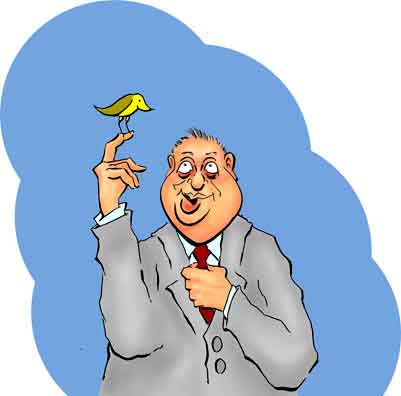
Rodney Dangerfield
A Master
A psychiatrist told his patient, "I think you're crazy."
"Well, I want a second opinion," the patient replied.
"OK," the doctor said. "You're ugly, too."
And there's the famous one liner:
When I was born I was so ugly the doctor slapped my mother.
Henny also helped lay down the ground for the now ubiquitous insult comic, as most famously evinced by "Mr. Warmth", Don Rickles. When performing in nightclubs, every comedian has to deal with the hecklers, and Henny could turn a one-liner into a stinger. When encountering a difficult member of the audience Henny would toss back:
Please, I have only an hour to make a jackass out of myself. You have all evening.
Does your parole board know you're up this late?
If Moses had seen you, there would be another Commandment.
What amazed Henny was when there were gangsters in the audience - up until the 1980's many night clubs were still being run by the mob. They loved such jokes. He could throw the barbs their way and they would just laugh.
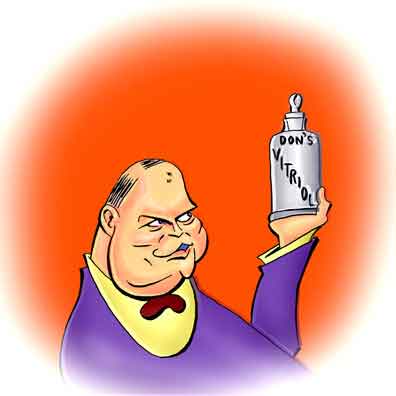
Don Rickles
Mr. Warmth
Henny lived past ninety and although in his later years he cut back the frequency of his performances, he never retired. Once a reporter asked him how long he was going to keep going. "As long," Henny said, "as they keep coming."
References
Take My Life, Please!, Henny Youngman, William Morrow and Company, 1991.
"Henny Youngman", The Famous People.
"Stand-Up Comedy", Richard Zoglin, Encyclopedia Britannica.
"Henny Youngman", NNDB.
"This Day in Jewish History 'Take My Wife Please' Comedian Passes On", David B. Green, Ha-Aretz February 24, 2015, Updated: April 10, 2018.
"Hurry, Hurry, Anthony Hiss, The New Yorker, September 5, 1977.
"Henny Youngman", Internet Movie Data Base.
"Late Night with David Letterman", David Letterman (host), Paul Schafer (musical director), Henny Youngman (guest), November 8, 1982, Internet Movie Data Base.
The Odds Against Me, John Scarne, Doubleday, 1966.
The Best of Henny Youngman, Henny Youngman (author), Milton Berle (Foreword), Grammercy Publishing Company, 1978.
Henny Youngman's Big Book of Insults, Running Press, 1995.
"Comedy Classics: Henny Youngman - 'Take My Wife, Please'", Jewish Humor Central, June 11, 2012.
"Henny Youngman, King of the One-Liners", Mervyn Rothstein, New York Times, February 25, 1998.
King of the One-Liners / At 91, Henny Youngman Keeps the Vaudeville Flame Burning", Joel Selvin, SFGate, January 29, 2012.
"One Liners: Best of Rodney Dangerfield and Henny Youngman" Retirement Party Ideas.
"Just Because the Rug was Pulled From Under Him", Roger Ebert, rogerebert.com, June 22, 2011.
"I Never Forget a Face, But I'll Make an Exception in Your Case", Quote Investigator, April 26, 2013.
"Henny Youngman", Randy Schoenberg, Genii, February 1, 2020.
"Take Henny Youngman...Please", Dale White, Off the Wall, Harvard Crimson, October 16, 1980.
"Swanee - Dancing Every Nite - No Monday Blues at Swanee - Music by Swanee Syncopaters", Washington Evening Star, November 1, 1926, p. 10.
"Meyer Davis And His Swanee Syncopators", Discogs.
"John Sheahan: 80 Years A-Growing", Siobhan Long, Irish Times, May 18, 2019.
"Seven Ways to Compute the Relative Value of a U.S. Dollar Amount - 1790 to Present", Measuring Worth
The Inklings: C S Lewis, J. R. R. Tolkien, Charles Williams, and Their Friends, Humphrey Carpenter,Allen and Unwin / Houghton-Mifflin, 1978.